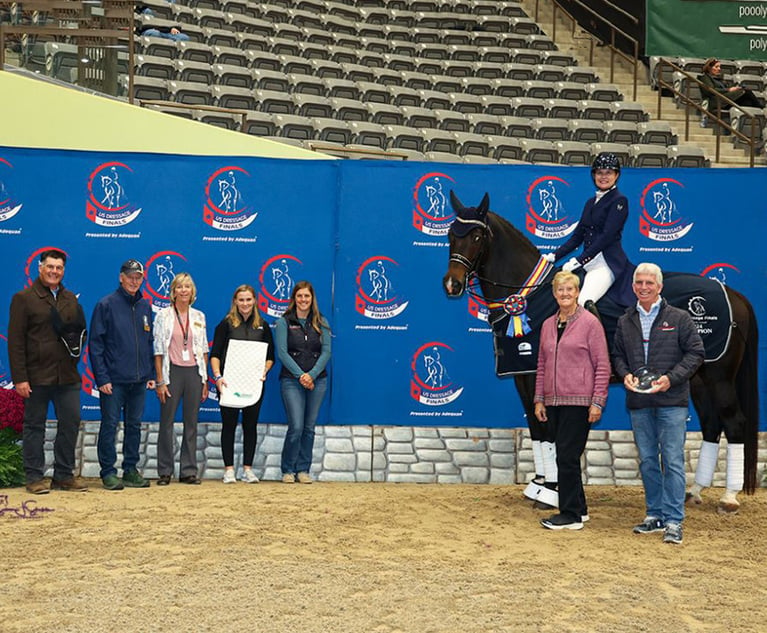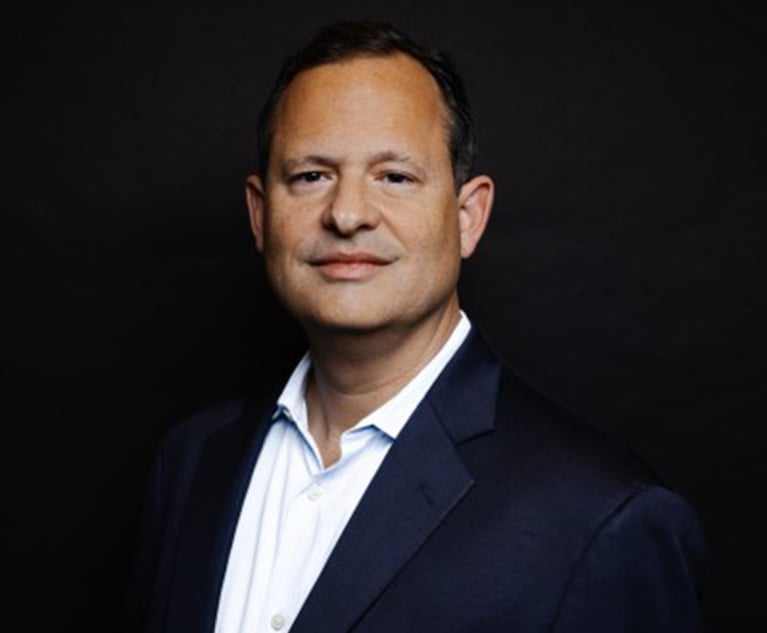 Supreme Court Justice Ruth Bader Ginsburg speaking at Georgetown Law in 2015. Photo by Diego M. Radzinschi/ ALM
Supreme Court Justice Ruth Bader Ginsburg speaking at Georgetown Law in 2015. Photo by Diego M. Radzinschi/ ALMWhy Ginsburg Joined Ruling Civil Rights Advocates Decry as 'Terrible'
"This ruling weakens our nation's oldest civil rights statute and may shut the courthouse door on some discrimination victims," a leading civil rights advocate said about the Supreme Court's decision in "Comcast v. National Association of African American Owned Media."
March 23, 2020 at 03:00 PM
6 minute read
The original version of this story was published on National Law Journal
A unanimous U.S. Supreme Court on Monday sent a clear message that plaintiffs bringing discrimination lawsuits under key civil rights laws now will face a high bar to winning federal court review of their claims.
That message, however, came with a separate warning from Justice Ruth Bader Ginsburg that the 1866 law at issue before the justices was "sweeping" and designed to "break down all discrimination between black men and white men" regarding "basic civil rights." Attempts to "cabin" its scope, as advanced by the Trump administration's Justice Department and others, "cannot be squared with the statute."
The case before the justices was a multibillion-dollar contract discrimination case brought by the National Association of African American Owned Media and Entertainment Studios Network against Comcast Corp. The justices ruled that a plaintiff who sues under 42 U.S.C. §1981, which guarantees an equal right to make contracts, must both plead and prove that race was the "but-for" cause of the injury.
"This ruling weakens our nation's oldest civil rights statute and may shut the courthouse door on some discrimination victims who, at the complaint stage, may simply be without the full range of evidence needed to meet the court's heightened standard," Kristen Clarke, president and executive director of the Lawyers' Committee for Civil Rights Under Law, said in a statement Monday.
With the exception of Ginsburg's separate concurrence, her colleagues on the left joined the decision without comment. Those colleagues' silence may reflect the reality that the high court, often in 5-4 decisions, in recent years has been applying the "but-for" causation test to civil rights laws where Congress has not explicitly imposed a different standard, and that standard is now, as Ginsburg conceded, "the default rule."
Business advocates, meanwhile, applauded the decision. Cory Andrews, Washington Legal Foundation's vice president for litigation, said the unanimous decision "restores common sense and uniformity to the pleading threshold for discrimination claims under §1981."
Gibson, Dunn & Crutcher partner Miguel Estrada argued on behalf of Comcast. Erwin Chemerinsky, dean of the University of California Berkeley School of Law represented Entertainment Studios Network.
The Supreme Court, in an opinion by Justice Neil Gorsuch, rejected arguments by Entertainment Studios Network and the U.S. Court of Appeals for the Ninth Circuit that a plaintiff must only plead facts plausibly showing that race played "some role" or motivating factor in the defendant's decision-making process.
The justices vacated the Ninth Circuit decision and remanded it for application of the correct causation standard.
Entertainment Studios Network sued Comcast after negotiations failed to persuade the cable television company to carry the African American-owned television network's programming. Comcast cited lack of demand for the programming, bandwidth constraints and preference for programs that the network did not provide. The network alleged Comcast disfavored "100% African American-owned media companies."
Gorsuch said the rule requiring a plaintiff to establish causation is well established. "In the law of torts, this usually means a plaintiff must first plead and then prove that its injury would not have occurred 'but for' the defendant's unlawful conduct," he wrote. "The plaintiffs before us suggest that 42 U.S.C. §1981 departs from this traditional arrangement. But looking to this particular statute's text and history, we see no evidence of an exception."
This burden on the plaintiff, he added, remains constant from filing to judgment.
The justices declined to rule on whether the statute addresses the whole contracting process, not just outcomes—the right to contract, sue, be a party, and give evidence—as Comcast and the Justice Department argued. Gorsuch said answering that question was not needed to resolve the case.
Today's SCOTUS decision in the #Comcast case is getting credit because it's not as bad as it could have been (see Justice Ginsburg's concurrence), but it is still harmful for civil rights plaintiffs, placing on them an add'l burden at the very outset of their claim.
— Sherrilyn Ifill (@Sifill_LDF) March 23, 2020
Ginsburg made two points in her concurring opinion. First, she said, a strict "but-for causation" standard is "ill-suited to discrimination cases and inconsistent with tort principles." Ginsburg, however, said she recognized the standard is now the "default rule" for anti-discrimination laws.
Second, Ginsburg criticized Comcast's view of §1981. That view, she wrote, "countenances racial discrimination so long as it occurs in advance of the final contract-formation decision." That view, she said, would allow an employer to reimburse expenses for white interviewees but require black applicants to pay their own way. And, citing the government's amicus brief, an employer could "refuse to consider applications" from all black applicants without violating the law.
"Far from confining §1981's guarantee to discrete moments, the language of the statute covers the entirety of the contracting process," she wrote.
In a statement, Comcast said "the Supreme Court unanimously restored certainty on the standard to bring and prove civil rights claims. The well-established framework that has protected civil rights for decades continues. The nation's civil rights laws have not changed with this ruling; they remain the same as before the case was filed."
Chemerinsky called the Comcast ruling a "terrible" decision for civil rights. "It is a very difficult standard to meet," he said referring to but-for causation. "I think the battle will now shift to Congress to amend section 1981 and perhaps other civil rights statutes to allow claims to go forward on a showing that race is a motivating factor in the denial of a contract."
This content has been archived. It is available through our partners, LexisNexis® and Bloomberg Law.
To view this content, please continue to their sites.
Not a Lexis Subscriber?
Subscribe Now
Not a Bloomberg Law Subscriber?
Subscribe Now
NOT FOR REPRINT
© 2024 ALM Global, LLC, All Rights Reserved. Request academic re-use from www.copyright.com. All other uses, submit a request to [email protected]. For more information visit Asset & Logo Licensing.
You Might Like
View All
'New Circumstances': Winston & Strawn Seek Expedited Relief in NASCAR Antitrust Lawsuit
3 minute read
'It Refreshes Me': King & Spalding Privacy Leader Doubles as Equestrian Champ
5 minute read
Federal Judge Rejects Teams' Challenge to NASCAR's 'Anticompetitive Terms' in Agreement

As Uncertainty Hovers Over PGA Merger, LIV Golf Hires Entertainment Industry Veteran as Legal Chief
Law Firms Mentioned
Trending Stories
- 1Judge Denies Sean Combs Third Bail Bid, Citing Community Safety
- 2Republican FTC Commissioner: 'The Time for Rulemaking by the Biden-Harris FTC Is Over'
- 3NY Appellate Panel Cites Student's Disciplinary History While Sending Negligence Claim Against School District to Trial
- 4A Meta DIG and Its Nvidia Implications
- 5Deception or Coercion? California Supreme Court Grants Review in Jailhouse Confession Case
Who Got The Work
Michael G. Bongiorno, Andrew Scott Dulberg and Elizabeth E. Driscoll from Wilmer Cutler Pickering Hale and Dorr have stepped in to represent Symbotic Inc., an A.I.-enabled technology platform that focuses on increasing supply chain efficiency, and other defendants in a pending shareholder derivative lawsuit. The case, filed Oct. 2 in Massachusetts District Court by the Brown Law Firm on behalf of Stephen Austen, accuses certain officers and directors of misleading investors in regard to Symbotic's potential for margin growth by failing to disclose that the company was not equipped to timely deploy its systems or manage expenses through project delays. The case, assigned to U.S. District Judge Nathaniel M. Gorton, is 1:24-cv-12522, Austen v. Cohen et al.
Who Got The Work
Edmund Polubinski and Marie Killmond of Davis Polk & Wardwell have entered appearances for data platform software development company MongoDB and other defendants in a pending shareholder derivative lawsuit. The action, filed Oct. 7 in New York Southern District Court by the Brown Law Firm, accuses the company's directors and/or officers of falsely expressing confidence in the company’s restructuring of its sales incentive plan and downplaying the severity of decreases in its upfront commitments. The case is 1:24-cv-07594, Roy v. Ittycheria et al.
Who Got The Work
Amy O. Bruchs and Kurt F. Ellison of Michael Best & Friedrich have entered appearances for Epic Systems Corp. in a pending employment discrimination lawsuit. The suit was filed Sept. 7 in Wisconsin Western District Court by Levine Eisberner LLC and Siri & Glimstad on behalf of a project manager who claims that he was wrongfully terminated after applying for a religious exemption to the defendant's COVID-19 vaccine mandate. The case, assigned to U.S. Magistrate Judge Anita Marie Boor, is 3:24-cv-00630, Secker, Nathan v. Epic Systems Corporation.
Who Got The Work
David X. Sullivan, Thomas J. Finn and Gregory A. Hall from McCarter & English have entered appearances for Sunrun Installation Services in a pending civil rights lawsuit. The complaint was filed Sept. 4 in Connecticut District Court by attorney Robert M. Berke on behalf of former employee George Edward Steins, who was arrested and charged with employing an unregistered home improvement salesperson. The complaint alleges that had Sunrun informed the Connecticut Department of Consumer Protection that the plaintiff's employment had ended in 2017 and that he no longer held Sunrun's home improvement contractor license, he would not have been hit with charges, which were dismissed in May 2024. The case, assigned to U.S. District Judge Jeffrey A. Meyer, is 3:24-cv-01423, Steins v. Sunrun, Inc. et al.
Who Got The Work
Greenberg Traurig shareholder Joshua L. Raskin has entered an appearance for boohoo.com UK Ltd. in a pending patent infringement lawsuit. The suit, filed Sept. 3 in Texas Eastern District Court by Rozier Hardt McDonough on behalf of Alto Dynamics, asserts five patents related to an online shopping platform. The case, assigned to U.S. District Judge Rodney Gilstrap, is 2:24-cv-00719, Alto Dynamics, LLC v. boohoo.com UK Limited.
Featured Firms
Law Offices of Gary Martin Hays & Associates, P.C.
(470) 294-1674
Law Offices of Mark E. Salomone
(857) 444-6468
Smith & Hassler
(713) 739-1250








